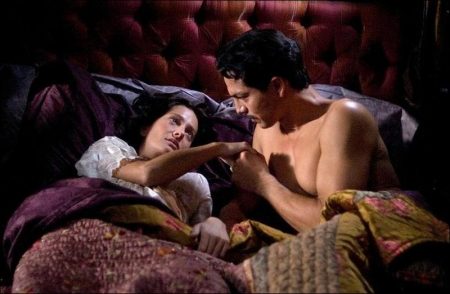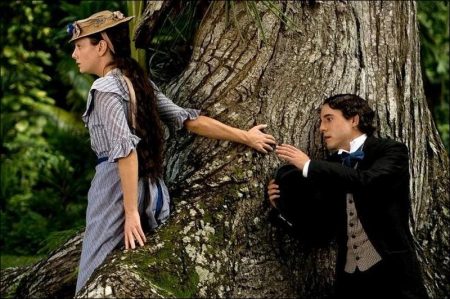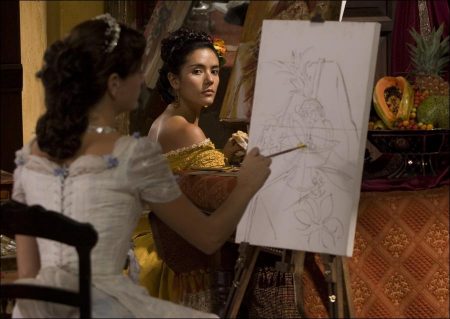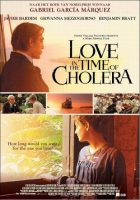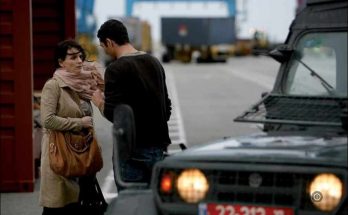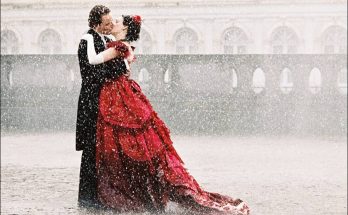Tagline: How long would you wait for love?
Love in the Time of Cholera. Stone Village Pictures presents one of the greatest love stories ever told, based on the timeless masterpiece by Nobel Prize-winning author Gabriel García Márquez… Love in the Time of Cholera. Spanning a half-century in the complex, magical and sensual city of Cartageña, Colombia, the sweeping romantic epic tells the story of a man who waits over fifty years for his one true love.
Academy Award nominee Javier Bardem stars as Florentino Ariza, a poet and telegraph clerk who discovers his life’s passion when he sees Fermina Daza (Giovanna Mezzogiorno) through the window of her father’s villa. Through a series of passionate letters, Florentino gradually awakens the young beauty’s heart, but her father (John Leguizamo) is furious when he learns of the affair, and vows to keep them apart forever.
As the years go by, Fermina marries the sophisticated aristocrat Dr. Juvenal Urbino (Benjamin Bratt), who has brought order and medicine to Cartageña, stemming the waves of cholera that mysteriously besiege the city. He sweeps her away to Paris for years, and when they start their lives together back in Cartageña, she has all but forgotten her first love. But Florentino has not forgotten her. Now a wealthy ship-owner, Florentino engages in a series of affairs but still yearns for Fermina. His heart is patient, and he will wait a lifetime for the chance to be with her again.
The First-Ever Adaptation of a Timeless Epic
Director Mike Newell describes Love in the Time of Cholera, literary giant Gabriel García Márquez’s 1985 masterpiece spanning half a century of love, war and generations, as “a great big ocean liner of a story that tells truths about people from youth to old age. I can see my parents in it, myself when I was young, myself and my friends now.”
“The story is so unique and so original,” says producer Scott Steindorff. “It’s one of the greatest love stories ever told. The way García Márquez writes, and the time periods of the book, I felt it was an incredible epic love story that had to be brought to the screen.”
Considered to be one of the great novels of the 20th century, Love in the Time of Cholera was originally published in 1985 in Colombia by Editorial Oveja Negra Ltda. and sent shockwaves throughout the literary world when it was published around the world three years later. García Márquez’s singular novel soon gained a worldwide following and picked up numerous awards (the author won the coveted Nobel Prize in 1982 for his body of work, including his novel One Hundred Years of Solitude). Not a traditional love story, the novel explores the experience of a collection of complicated characters whose lives intertwine in an unnamed city over a half-century of intense change – the period between the late 19th and early 20th centuries.
Producer Steindorff’s journey with the project began several years ago when executive producer Dylan Russell gave him the novel. “He demanded that I read the book, even though the rights were not available,” Steindorff recalls. “So, I read it, and I couldn’t put it down.”
From that moment, he steadfastly pursued the rights through his company, Stone Village Productions, which he founded in 2000. “We persisted,” Steindorff explains. “Like the character Florentino, I just wouldn’t take no for an answer. We spent about a year getting rejected with no hope of getting the movie rights, and then one day, we got the word: `Maybe.’ It took us about another year to convince the author that we would be true to the book, and we would make a great film without compromising any of the elements of the book.”
Though García Márquez was initially reluctant to give over his novel to an English-language movie adaptation, the producer convinced him with his sheer passion and will, eventually winning the author’s blessing. Steindorff then enlisted Oscar-winning screenwriter Ronald Harwood (The Pianist) to adapt the epoch-sprawling, richly detailed novel. “The story is not just a love story; it’s about life,” says Steindorff. “Ronald Harwood really had a deep understanding of the subtext of this book about life and love, and the meaning of love. He wrote a brilliant adaptation of this great novel.”
“You have this very famous literary work and author, you have to have someone comparable to do the adaptation,” says executive producer Dylan Russell. “From Ron’s work, we knew he was someone who understood the sense of time in an epic story, and would also be able to tell it in a nonlinear way. He is an amazing playwright and Oscar winner, and while he was excited about the adaptation, he knew it would be a challenge.”
“When I first read the book, I was not sure it could be made into a film,” says Harwood. “So much of the characters’ journeys are internal, and it takes place over so many years and in such unconventional ways, but we were all excited about the prospect of doing it.”
As the adaptation began to take shape, Harwood and Steindorff consulted with the author to ensure the film would reflect the spirit that lives in the book. “Of the first draft of the script, García Márquez said, `The problem is that you and the writer have done too true of an adaptation – you need to depart from the book,’” Steindorff remembers. “He has a great sense of humor, so we laughed and laughed.”
Steindorff found an ideal filmmaking partner in director Mike Newell, fresh off his journey into the world of Hogwarts with Harry Potter and the Goblet of Fire. Newell’s films, such as Four Weddings and a Funeral, traversed unconventional romantic journeys. Like the producer, Newell held a deep affinity for the book and expressed a passionate vision for the film. “Mike Newell understood these characters,” says Steindorff. “He understood the nuances of these people’s lives, from the broad arc of the world García Márquez created to the intimate, personal journeys of the characters.”
“I wanted to make a film that expressed the richness of the book, which is an exploration of love in all its complications, nuances and power,” says Newell. “The love triangle at the core of the story anchors a vast and deep exploration of love in all its forms – not only through the eyes of the central characters, but in the hearts of mothers, fathers and friends.”
Florentino Ariza’s 50-year quest to be close to the love of his life is a South American story, but one that also expresses the universal human experience of the vagaries of love, all told through García Márquez’s unique voice and spirit. “You always look back at old boyfriends, old girlfriends, and you wonder what life would’ve been like if you had gone that way,” says Newell. “And this is somebody who’s taken those wonderings and actually made a plot out of them, which is extraordinary. So you find yourself sucked in by your own life.”
“The curious fidelity of Florentino to Fermina, that 50-year fidelity, is kind of an ideal,” says screenwriter Harwood. “Regret is not part of his vocabulary because he lives in hope. And it is a hope ultimately fulfilled.”
Continue Reading and View the Theatrical Trailer
Love in the Time of Cholera (2007)
Directed by: Mike Newell
Starring: Javier Bardem, Giovanna Mezzogiorno, Benjamin Bratt, John Leguizamo, Liv Schreiber, Catalina Sandino Moreno, Fernanda Montenegro, Hector Elizondo
Screenplay by: Ronald Harwood (Gabriel Garcia Marquez’in kitabından)
Cinematography by: Alfonso Beato
Production Design by: Wolf Kroeger
Costume Design by: Marit Allen
Set Decoration by: Elli Griff
Art Direction by: Roberto Bonelli, John King, Paul Kirby
Jonathan McKinstry
Music by: Antonio Pinto, Shakira
MPAA Rating: R for sex content / nudity and brief language.
Distributed by: New Line Cinema
Release Date: November 16, 2007
Views: 92
